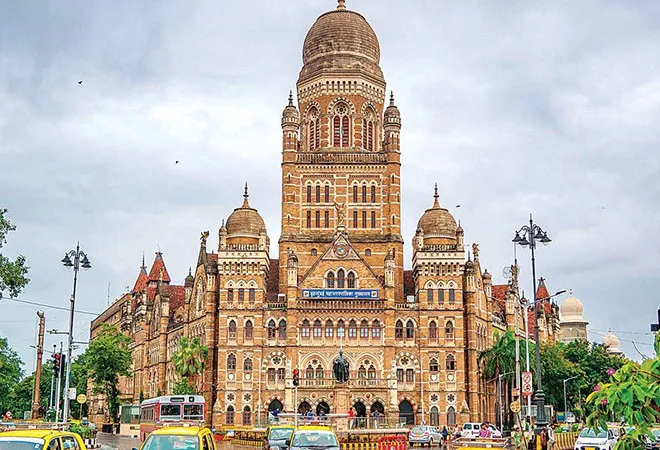The Brihanmumbai Municipal Corporation (BMC) published the Mumbai Climate Action Plan (MCAP) on March 13, 2022, setting forth a comprehensive roadmap to transform Mumbai into a net-zero and climate-resilient city. The MCAP aligns with the goals of the Paris Agreement, aiming to drastically reduce Mumbai’s greenhouse gas (GHG) emissions and integrate climate change strategies to manage the increasing climate risks. Energy efficiency is a critical aspect of this transformation, and BMC’s initiatives under the climate budgeting process for FY 2024-25 demonstrate a robust commitment to sustainable energy use.

Overview of MCAP
MCAP provides a detailed framework to address climate challenges, focusing on six priority sectors: Energy & Buildings, Integrated Mobility, Sustainable Waste Management, Urban Greening and Biodiversity, Air Quality, and Urban Flooding & Water Resource Management. Each sector has designated action tracks to guide implementation and ensure targeted outcomes. For the Energy & Buildings sector, the emphasis is on transitioning to clean fuels, enhancing resource efficiency, and decarbonizing Mumbai’s electricity generation mix.
Objectives of Climate Change Budgeting
The climate budget for Mumbai aims to mainstream climate commitments into the city’s financial planning and decision-making processes. The key objectives include:
- Dissemination of Climate Priorities: To communicate Mumbai’s climate commitments and priorities for the upcoming financial year to various stakeholders, including decision-makers, government authorities, businesses, and citizens.
- Implementation of MCAP Recommendations: To ensure the actions and recommendations of MCAP are implemented effectively and current budget items are aligned with climate action goals.
- Assessment of Municipal Budget: To evaluate BMC’s existing budget through a climate lens, identifying opportunities for making budget items more climate-friendly.
- Monitoring and Evaluation: To track the progress of MCAP’s goals and targets annually, ensuring accountability and transparency.
- Identifying Climate Projects: To pinpoint potential climate projects that can attract external financing and support Mumbai’s climate objectives.
The Climate Change Budgeting Process
Mumbai’s participation in the C40 Cities’ climate budget pilot program since September 2021 has been pivotal in developing and refining its climate budgeting process. The BMC’s Environment Department, supported by WRI India and C40 Cities, led the integration of the climate budget template into the financial planning for FY 2024-25. This involved extensive inter-departmental consultations and training to ensure all climate-relevant departments could effectively contribute to the climate budget.
Direct Actions for FY 2024-25
The climate budget identifies several direct actions to reduce GHG emissions, categorized into quantified and non-quantified actions.
Quantified Direct Actions
These actions have measurable impacts on emission reductions. Key initiatives include:
- Solid Waste Management at Deonar Dumping Ground: Development of a Waste-to-Energy (WTE) project and a biomining project at Deonar, estimated to reduce emissions by over 2.11 million tonnes CO2e annually.
- Dumpsite Reclamation at Mulund: A reclamation project at Mulund Dumping Ground, expected to reduce emissions by 5.16 million tonnes CO2e over its lifecycle.
- High Mast System Upgrade: Upgrading the high mast lighting system to more efficient models, reducing emissions by approximately 1244 tonnes CO2e annually.
- Solar Panel Installation: Installing solar panels at various municipal buildings, including hospitals and markets, leading to significant emission reductions.
- Electric Vehicle Procurement: Acquiring 20 EV sedan cars for the transport department, contributing to the reduction of emissions from municipal transport.
Non-Quantified Direct Actions
These actions, though not easily quantifiable, are essential for building long-term climate resilience:
- Energy-Efficient Infrastructure: Initiatives like replacing air conditioning units with more energy-efficient models and setting up eco-friendly wood pyre cremation systems.
- Organic Waste Converters: Installing organic waste converters at municipal markets to promote decentralized waste management and recycling.
- Solar Power Projects: Developing renewable hybrid energy projects at key locations such as the Middle Vaitarna Dam and the New Master Balancing Reservoir at Bhandup Complex.
Enabling Actions
In addition to direct actions, the climate budget includes several enabling actions to support the broader implementation of MCAP. These actions focus on enhancing the city’s infrastructure and services to create a resilient foundation for future climate initiatives.
Budgetary Allocation
The BMC has allocated significant financial resources to support these climate measures. For FY 2024-25, approximately 32.18% of the capital budget expenditure (INR 10,224.24 crores) is dedicated to activities directly aligned with MCAP, while 6.81% (INR 2,163.8 crores) is allocated for activities integrating components of MCAP. This financial commitment underscores the importance of climate action in Mumbai’s governance and development agenda.
Conclusion
The Mumbai Climate Action Plan and the associated climate budgeting process represent a pioneering approach to urban climate governance. By integrating energy efficiency and sustainable practices into its financial planning, Mumbai is setting a precedent for other cities to follow. The concerted efforts of BMC and its partners in implementing these initiatives are crucial for achieving Mumbai’s ambitious climate goals, ensuring a sustainable and resilient future for all its residents.
As Mumbai moves forward with its climate action plan, continuous monitoring, evaluation, and adaptation of strategies will be essential to address emerging challenges and leverage new opportunities in the fight against climate change. The city’s commitment to energy efficiency and climate resilience is a testament to its dedication to securing a better future for its citizens and the global community.
